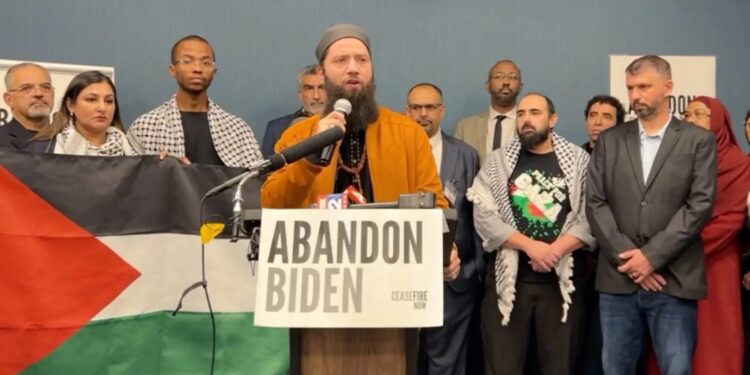In recent months, a political movement known as the #AbandonBiden campaign has emerged within the Arab-American and Muslim-American communities. Led by figures like University of Minnesota Professor Hassan Abdel Salam, this movement aims to encourage Arab and Muslim Americans to vote against President Joe Biden in the upcoming elections. Rooted in discontent over Biden’s handling of the Israeli-Palestinian conflict, the campaign seeks to send a powerful message to the Democratic Party that these communities cannot be taken for granted.
Background:
The #AbandonBiden movement gained momentum in response to President Biden’s perceived endorsement of Israeli Prime Minister Benjamin Netanyahu’s military actions in the Gaza Strip. The campaign argues that this marks a turning point in Arab- and Muslim-American political history, demanding increased attention to the community’s concerns regarding the Israeli-Palestinian conflict.
Key Objectives:
Political Empowerment: The campaign aims to show the Democratic Party that Arab and Muslim Americans are a formidable voting bloc that should not be overlooked. By leveraging their influence in critical swing states, including Michigan, Minnesota, Arizona, Wisconsin, Georgia, Nevada, and Pennsylvania, the movement seeks to make a significant impact on the 2024 presidential election.
Accountability: #AbandonBiden is a call for accountability. It demands that the Democratic Party takes the community’s stance on the Israeli-Palestinian conflict more seriously. The organizers argue that the Biden administration must prioritize the call for an end to Israel’s actions in Gaza, demonstrating a commitment to the fundamental principles of life and dignity.
Long-Term Political Engagement: The movement emphasizes that its goal is not a short-term approach to American politics. It does not endorse any specific alternative candidate but urges Arab and Muslim Americans to demand respect and consideration from any administration in power. The focus is on long-term political engagement and ensuring that the community’s concerns are consistently heard.
Challenges and Criticisms:
The #AbandonBiden campaign faces challenges, including potential divisions within the Arab-American and Muslim-American communities regarding the effectiveness of such a movement. Critics argue that withholding support from the Democratic Party may not necessarily lead to policy changes and that engagement from within the political system is more effective.
Impact on Foreign Policy:
The movement highlights the intricate relationship between domestic political dynamics and U.S. foreign policy, particularly in the context of the Israeli-Palestinian conflict. It underscores the potential influence of Arab and Muslim Americans in shaping America’s approach to issues affecting the Middle East.
The #AbandonBiden campaign emerges as a unique expression of political discontent within the Arab-American and Muslim-American communities, emphasizing the importance of their collective voice in shaping U.S. policies. As the movement gains traction, it will be interesting to observe its impact on the political landscape and whether it prompts a reconsideration of the Democratic Party’s engagement with these communities.
















